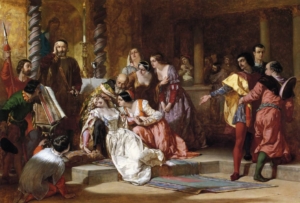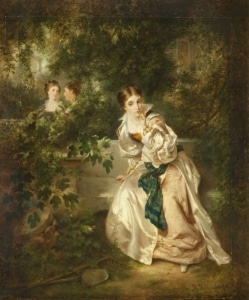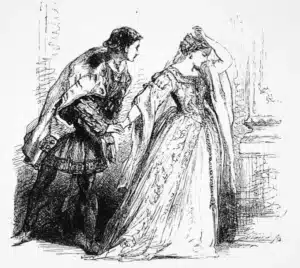DCPA NEWS CENTER
Enjoy the best stories and perspectives from the theatre world today.
Enjoy the best stories and perspectives from the theatre world today.

There’s something very modern about Shakespeare’s Much Ado About Nothing. The rapid-fire zings, the flirty aggression — If Beatrice and Benedick met today, they would badmouth and ghost each other on a dating app. Fortunately, the play is respectfully presented in its original form, only stylistically updated to the 1930s in the DCPA Theatre Company’s production, directed by Chris Coleman.
Written in 1598, Much Ado is quite a contemporary-feeling play, owing partly to its writing style — 90% prose rather than verse. (That may be why it has been so often adapted for film.) Of course the subject of romantic complications is timeless, but even the title is cleverly meta, making fun of its own content.
Crucially, Beatrice, the strong female at the heart of the story, is a combination of snarky and coy that feels rather contemporary.

The wedding scene in Much Ado About Nothing. Painting by Alfred Elmore
“Beatrice is very modern in her thinking about men and women,” Coleman said. “She’s extremely blunt and forthright in how she deals with even the most powerful.”
Picking Much Ado About Nothing for the Theatre Company’s first post-pandemic season was an easy call for Coleman, who serves as the Theatre Company’s Artistic Director. “I wanted the next Shakespeare after the pandemic to be joyful, celebratory.”
The season’s theme is joy — specifically, the joy of being together in the theatre again after too many socially-distanced months. What could be a better fit than the classic Renaissance rom-com?
“We’re all still very much navigating and assessing what we need from entertainment, from engagement with the community, with how much we can digest,” Coleman said. “I’ve never been somebody who understood when subscribers said, ‘I just want the light stuff.’ But I understood after the pandemic.”
During those difficult times, Coleman recalled, even he would start a show on HBO, only to reject it as too much to bear. “It will be interesting to see how long it takes us to get our armor back.”

Beatrice in Much Ado About Nothing. Painting by Robert Alexander Hillingford
Much Ado should help. With snappy dialog full of creative insults, the battle-of-the-sexes romp has long been a crowd favorite. “It goes from sophisticated wordplay to really lowbrow comedy,” Coleman said.
But the serious undercurrents of deception and dishonor are present, too.
“That’s what is always rewarding, delicious and hard about Shakespeare. It’s never either/or. You have to wrestle with this really hard in-between.”
There are jokey moments, ready to be mined. “We’ll get as much comedy out of it as we possibly can. He’s built it all in there for you,” Coleman said. “The trick is setting up a world where you also have permission to go deep when you need to.”
Much Ado About Nothing goes for laughs until a third of the way through when it takes an abrupt turn.
“It’s a classic rom com until that rift,” Coleman said. Through a ploy, the community is led to believe that the young bride-to-be, Hero, has been unfaithful. The extreme reaction is shocking by today’s mores. Hero’s intended, Claudio, and even her father, Leonato, violently reject her, even as she swears she has been loyal.
(Best to avoid out-of-context critiques. Anyone listening for anti-feminist, patriarchal ideas will have a field day throughout the play. But strict gender roles were a Renaissance staple.)
How does this sudden turn make sense even within the context of the play? How does a father take offense at his daughter’s supposed indiscretion, enough to wish her dead?

Beatrice and Benedick in Much Ado About Nothing. Painting by John Gilbert
“It’s interesting to wrestle with, interesting to try to get inside Claudio’s head, inside Leonato’s head,” Coleman said. “It’s part social pressure. What is their relationship to their own sense of shame/honor? What is their sense of their honor being diminished?”
There’s much more than frothy rom-com sentiment here. As in Shakespeare’s other comedies, Much Ado expands to cover a range of genres. “He’s daring the form to hold as much weight as it possibly can,” Coleman said. As a light comedy, “it shouldn’t be able to carry that level of drama, and yet it does.”
The staging promises to be innovative. Coleman said when he first considered the production, “honestly, I could see it happening in two different ways: in its own period, on the northeast coast of Sicily, the Renaissance. That could be interesting. But we just did Twelfth Night in period.
“The other possibility was the same locale, but 20th century. We brainstormed and ended up setting it in the ’30s on the northeast coast of Sicily, maybe with some reference to the Spanish civil war” as the men return home at the start of the play.
“What’s clear to me is, it’s a play about trust,” Coleman said. Beatrice and Benedict have been burned in relationships in the past so they’ve each sworn off the opposite sex — a red flag. “Whenever someone says something definitive like that in Shakespeare, you know you’re in for a big whopping.”
From his knowledge of the Bard, Coleman concludes Shakespeare’s ideas about marriage were “conflicted.” Maybe the playwright had his own trust issues?
In this case, Beatrice and Benedick have “spent a lot of energy pushing away romance.” They are both well defended against the possibility.
“They are both strong minded, smart and funny,” Coleman said. “Of course they would be good partners if they would ever shut up.”
DETAILS
Much Ado About Nothing
Sep 30 – Nov 6 • Kilstrom Theatre
Tickets
